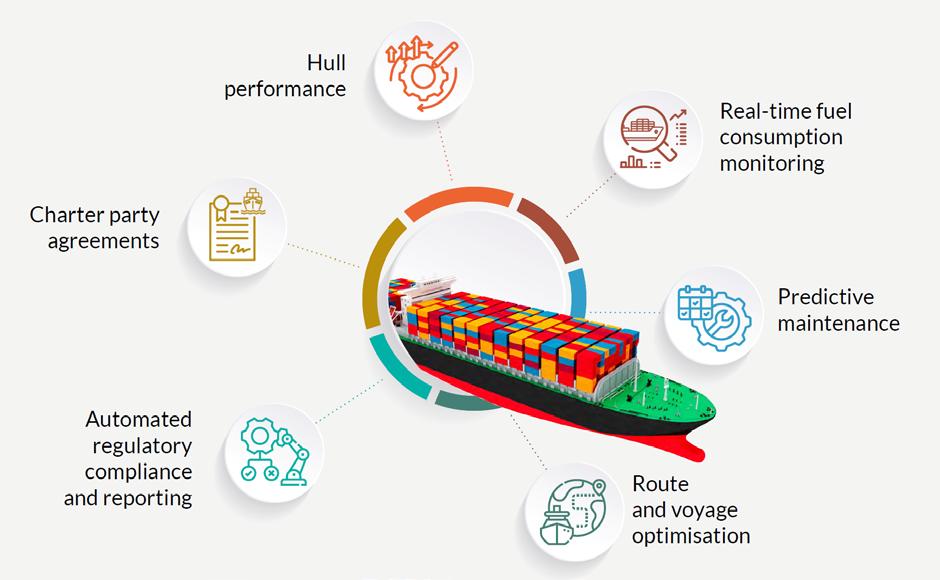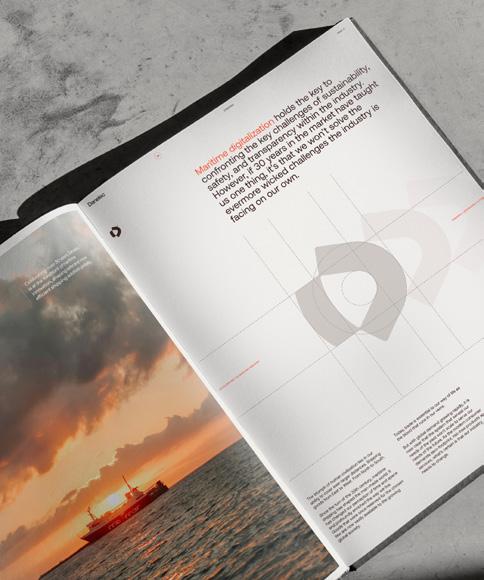
7 minute read
The bridge between traditional and modern.
Using high-frequency data to beat modern shipping's biggest challenges
by Casper Jensen, CEO, Danelec
It is widely recognised that digitalisation is making a positive impact on the pursuit of safer, more efficient, and environmentally responsible shipping. For decades, vessel performance has relied on analysing low-frequency data (LFD), with noon reports serving as the industry standard. While these continue to provide valuable operational snapshots, their limitations are increasingly evident in an era where real-time decision-making is crucial to realising gains throughout a voyage and across a fleet. High-frequency data (HFD) is emerging as the next step, providing shipowners & operators with continuous, granular insights that enable smarter, data-driven decisions.
Recent research from Thetius, in collaboration with Danelec, has underscored the growing importance of HFD in modern maritime operations. The findings reveal that while LFD remains valuable, it is increasingly being supplemented by real-time, high-resolution insights that empower owners-operators to make more informed operational decisions. The publication highlights how forward-thinking shipping companies are already leveraging HFD to enhance fleet efficiency, improve fuel management, and ensure compliance with tightening environmental regulations. The Unlocking Fleet Efficiency: The Power of High-Frequency Data report reflects on the need to bridge the gap between traditional noon reports and automated data-driven analytics, validating a phased digital transition in order for shipowners & operators to take control of their digital journey.
The best of both worlds
Danelec has been equipping vessels with the tools necessary to harness the full potential of real-time data for more than 30 years. With HFD collection systems now installed on 15,000+ ships worldwide, the company's solutions are helping owners-operators to optimise performance, reduce emissions, and ensure regulatory compliance. However, while HFD represents the future, Danelec recognises that the majority of the global fleet - nearly 70% - still relies on LFD for operational performance insights. Rather than advocating for an abrupt revolution across a fleet, a pragmatic, phased approach that bridges the gap between traditional and modern data strategies will ensure a cost-effective evolution.
Noon reports remain a widely used tool for monitoring vessel operations, providing valuable insights into fuel consumption, speed, and overall efficiency. They will remain a staple of daily operations for the foreseeable future, but their lack of immediacy to make informed real-time decisions and inevitable human-led bias leaves room for improvement. The challenge lies not in replacing the use of LFD-based noon reports overnight but in enhancing it with supplementary digital capabilities.
By bridging the gap between traditional and modern data strategies, Danelec is positioning itself as an essential partner for maritime companies aiming to stay competitive in an increasingly data-driven world. With a flexible platform, and so-called Data Pool capabilities that allow noon report-only vessels to be supplemented with HFD from similar vessels to increase voyage prediction accuracy, shipowners & operators can start small but be prepared to evolve when the time is right.
Each shipping company has unique operational constraints and business priorities, and any transition to digital solutions must accommodate these differences. Noon reports build the performance baseline, but scaling up to real-time monitoring and advanced analytics can unlock deeper insights and greater efficiencies over time.
With a platform that seamlessly integrates LFD with advanced analytics, we provide shipowners with the flexibility to evolve at their own pace. Such an adaptable approach ensures that shipping companies are not overwhelmed by the costs or complexities of digital transformation, instead offering a tailored path that aligns with their operational and financial readiness.
High-fidelity = high-quality
The operational advantages of HFD are becoming increasingly clear: by continuously monitoring key vessel systems such as propulsion, engine performance, and hull conditions, shipowners can leverage real-time insights to make data-driven decisions that reduce costs and enhance safety. For instance, predictive maintenance is one of the most promising applications of HFD. By identifying anomalies in sensor data before they develop into critical failures, operators can schedule maintenance proactively, preventing costly breakdowns and reducing downtime. This level of foresight is simply not possible with LFD alone.
However, while the benefits of HFD are substantial, challenges remain. One of the primary hurdles is data quality. Sensors can degrade over time, leading to inaccurate readings that compromise decision-making. Recognising this issue, Danelec has developed the Data Quality Module, a solution that ensures high-fidelity fleet data by providing real-time sensor monitoring and automated anomaly detection. By minimising the risk of erroneous data, the module enhances the reliability of performance analytics, allowing owners-operators to make informed decisions with confidence.
Compliance granularity
High-frequency data also accommodates improved processes for regulatory compliance, which is one of the stronger catalysts for the industry's embrace of digital solutions. With new environmental regulations - like the EU Monitoring, Reporting, and Verification Regulation and its UK equivalent, the IMO Data Collection System, FuelEU, and the EU Emissions Trading System - companies must be able to track and report vessel/fleet emissions data with unprecedented accuracy.
Noon reports, while useful for historical analysis, struggle to provide the level of granularity required for regulatory compliance. HFD, on the other hand, offers continuous emissions monitoring, allowing operators to make proactive adjustments that enhance fuel efficiency and reduce carbon footprints.
Demonstrating the real-word application and impact of HFD, our company launched this spring the Emissions Compliance Module within the Danelec Connect digital ecosystem. It is a cost-effective solution designed to streamline regulatory reporting; by automating emissions data transfer to class societies and third-party verifiers, the module eliminates the administrative burden associated with reporting.
The system not only ensures adherence to regulatory frameworks but also enables shipowners to optimise their emissions performance, identifying inefficiencies and implementing corrective measures in real-time.
At the heart of transformation
The implications of the HFD shift extend far beyond individual vessel performance. As more shipowners embrace digitalisation, the collective impact on the industry will be significant. Enhanced fleet efficiency, reduced emissions, and improved safety standards will contribute to a more sustainable and competitive global shipping sector. Moreover, as data-sharing practices improve, collaborative analytics may become increasingly valuable, allowing stakeholders across the supply chain to optimise logistics, minimise fuel consumption, and enhance operational predictability. Looking ahead, the maritime industry is poised for a future where real-time data is the norm rather than the exception. While the road to full HFD is long, the speed at which we are travelling is increasing. By providing solutions that accommodate both traditional and modern data strategies, Danelec is guiding the industry through this transition. Shipowners no longer need to choose between legacy systems and cutting-edge technology; with the right partner, they can navigate both worlds fluidly.
As shipping continues to evolve in response to environmental and economic pressures, one thing is clear: data will be at the heart of its transformation. Whether through noon reports or real-time analytics, the ability to harness high-quality data will define the success of maritime operations in the years to come. With its commitment to bridging the gap between LFD and HFD, our company is not only advancing digitalisation but also ensuring that every shipowner, regardless of their current technological capabilities, has a route to a smarter, more efficient future.
//
Danelec is a Danish scale-up operating at the forefront of maritime digitalization. With focus on innovative solutions and technology, the company is transforming maritime operations, and driving efficiency and safety for shipowners and operators worldwide. Onboard data collection incl. VDR and Shaft Power Meters as well as Ship Performance Monitoring and AI-based Analytics for Vessel and Voyage Optimization are Danelec's key areas of expertise. Visit danelec.com to learn more.










